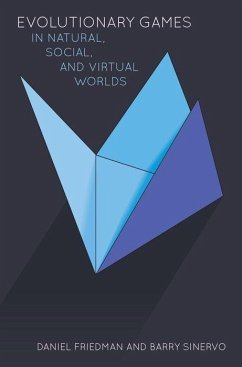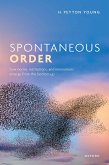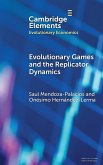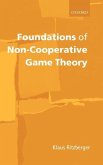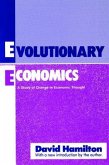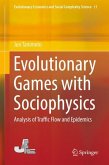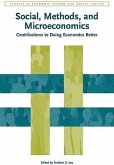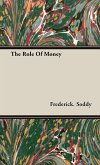- Gebundenes Buch
- Merkliste
- Auf die Merkliste
- Bewerten Bewerten
- Teilen
- Produkt teilen
- Produkterinnerung
- Produkterinnerung
Authors Daniel Friedman and Barry Sinervo show how to use theoretical developments in evolutionary game theory to build useful models describing parts of the worlds we live in --- the natural world of biology, the social world of politics, economics, etc., and the virtual world that is emerging from our connected electronic devices.
Andere Kunden interessierten sich auch für
![Spontaneous Order Spontaneous Order]() H Peyton YoungSpontaneous Order177,99 €
H Peyton YoungSpontaneous Order177,99 €![Evolutionary Games and the Replicator Dynamics Evolutionary Games and the Replicator Dynamics]() Saul Mendoza-PalaciosEvolutionary Games and the Replicator Dynamics66,99 €
Saul Mendoza-PalaciosEvolutionary Games and the Replicator Dynamics66,99 €![Foundations of Non-Cooperative Game Theory Foundations of Non-Cooperative Game Theory]() Klaus RitzbergerFoundations of Non-Cooperative Game Theory223,99 €
Klaus RitzbergerFoundations of Non-Cooperative Game Theory223,99 €![Evolutionary Economics Evolutionary Economics]() Evolutionary Economics197,99 €
Evolutionary Economics197,99 €![Evolutionary Games with Sociophysics Evolutionary Games with Sociophysics]() Jun TanimotoEvolutionary Games with Sociophysics100,99 €
Jun TanimotoEvolutionary Games with Sociophysics100,99 €![Social, Methods, and Microeconomics Social, Methods, and Microeconomics]() Social, Methods, and Microeconomics127,99 €
Social, Methods, and Microeconomics127,99 €![The Role Of Money The Role Of Money]() Frederick SoddyThe Role Of Money44,99 €
Frederick SoddyThe Role Of Money44,99 €-
-
-
Authors Daniel Friedman and Barry Sinervo show how to use theoretical developments in evolutionary game theory to build useful models describing parts of the worlds we live in --- the natural world of biology, the social world of politics, economics, etc., and the virtual world that is emerging from our connected electronic devices.
Hinweis: Dieser Artikel kann nur an eine deutsche Lieferadresse ausgeliefert werden.
Hinweis: Dieser Artikel kann nur an eine deutsche Lieferadresse ausgeliefert werden.
Produktdetails
- Produktdetails
- Verlag: Oxford University Press
- Seitenzahl: 434
- Erscheinungstermin: 1. März 2016
- Englisch
- Abmessung: 236mm x 155mm x 33mm
- Gewicht: 794g
- ISBN-13: 9780199981151
- ISBN-10: 0199981159
- Artikelnr.: 47867395
- Herstellerkennzeichnung
- Libri GmbH
- Europaallee 1
- 36244 Bad Hersfeld
- gpsr@libri.de
- Verlag: Oxford University Press
- Seitenzahl: 434
- Erscheinungstermin: 1. März 2016
- Englisch
- Abmessung: 236mm x 155mm x 33mm
- Gewicht: 794g
- ISBN-13: 9780199981151
- ISBN-10: 0199981159
- Artikelnr.: 47867395
- Herstellerkennzeichnung
- Libri GmbH
- Europaallee 1
- 36244 Bad Hersfeld
- gpsr@libri.de
Daniel Friedman is Distinguished Professor of Economics at the University of California, Santa Cruz. The author of over 100 articles and 5 previous books, his work has appeared in leading academic journals in economics, finance, and psychology. He is founder and director of LEEPS lab which conducts human subject experiments in market and strategic interaction, supported by 14 National Science Foundation grants along with grants from IBM, HP labs, Google, and Environmental Defense. Barry Sinervo, Full Professor, University of California, Santa Cruz, is an evolutionary biologist who conducts research on Behavioral Ecology, Game Theory and the Biotic Impacts of Climate Change. He has authored over 100 peer-reviewed publications. In addition to his research in game theory, he is currently researching contemporary extinctions of reptiles and amphibians and changes in plant communities driven by climate change, at sites distributed on five continents, leading a multinational research team of scientists developing physiological models of the biotic impacts of climate change on diverse biological systems, and measuring the biotic impacts of climate from equatorial sites to polar regions. He is also Director of the UC-wide Institute for the Study of the Ecological and Evolutionary Climate Impacts, a research consortium funded by a UC Presidential Research Catalyst Award.
* PART I: BASICS
* 1. Population Dynamics
* 1.1 Fitness
* 1.2 Tradeoffs and Fitness Dependence
* 1.3 Dependence on environment, density and frequency
* 1.4 State space geometry
* 1.5 Memes and Genes
* 1.6 Finite populations and randomness
* 1.7 Replicator dynamics in discrete time
* 1.8 Replicator dynamics in continuous time
* 1.9 Steady states and stability
* 1.10 Sexual dynamics
* 1.11 Discussion
* 1.12 Appendix A: Derivation of the Fisher equation
* 1.13 Appendix B. Replicator dynamics, mean fitness, and entropy
* 1.14 Exercises
* 1.15 Endnotes
* 1.16 Bibliography
* 2. Simple Frequency Dependence
* 2.1 The Hawk-Dove game
* 2.2 H-D parameters and dynamics
* 2.3 The three kinds of 2x2 games .
* 2.4 Dilemmas played by viruses and eBay sellers
* 2.5 Nonlinear frequency dependence
* 2.6 RPS and the simplex
* 2.7 Replicator dynamics for RPS
* 2.8 Discussion
* 2.9 Appendix A. Payoff differences in 3x3 games
* 2.10 Exercises
* 2.11 Endnotes
* 2.12 Bibliography
* 3. Dynamics in n-dimensional Games
* 3.1 Sectoring the 2-d simplex
* 3.2 Estimating 3x3 payoff matrices
* 3.3 More strategies
* 3.4 Nonlinear frequency dependence
* 3.5 Two population games: the square
* 3.6 Hawk-Dove with two populations
* 3.7 Own population effects
* 3.8 Higher dimensional games
* 3.9 Alternative dynamics
* 3.10 Discussion
* 3.11 Appendix: Estimating 3x3 payoff matrices
* 3.12 Exercises
* 3.13 Notes
* 3.14 Bibliography
* 4. Equilibrium
* 4.1 Equilibrium in 1 dimension
* 4.2 Nash equilibrium with n strategies
* 4.3 ESS with n strategies
* 4.4 Equilibrium in multi-population games
* 4.5 Fisherian runaway equilibrium
* 4.6 Discussion
* 4.7 Appendix A: Techniques to Assess Stability
* 4.8 Exercises
* 4.9 Notes
* 4.10 Bibilography
* 5. Social games
* 5.1 Assortative matching
* 5.2 Social Twists
* 5.3 Inheritance from two parents
* 5.4 The standard Price equation
* 5.5 Group-structured Price equation and cooperation
* 5.6 Group Structure and Assortativity in Lizards
* 5.7 Price Equation in Continuous Time
* 5.8 Discussion
* 5.9 Appendix: Equilibrium in the Kirkpatrick (1982) model
* 5.10 Exercises
* 5.11 Notes
* 5.12 Bibliography
* 6. Cellular Automaton Games
* 6.1 Specifying a CA
* 6.2 Prisoner's Dilemma
* 6.3 Snowdrift
* 6.4 Public goods games with two strategies
* 6.5 Spatial rock-paper-scissors dynamic
* 6.6 Application to bacterial strains
* 6.7 Buyer-seller game as a two population CA
* 6.8 Exercises
* 6.9 Notes
* 6.10 Bibliography
* PART II: APPLICATIONS
* 7. Rock-Paper-Scissors Everywhere
* 7.1 Some RPS Theory
* 7.2 Humans Play RPS in the Lab
* 7.3 RPS Mating Systems
* 7.4 Predators Learn
* 7.5 A coevolutionary model of Predators and Prey
* 7.6 Discussion
* 7.7 Appendix
* 7.8 Exercises
* 7.9 Notes
* 7.10 Bibliography
* 8. Learning in Games
* 8.1 Perspectives on learning and evolution
* 8.2 An empirical example
* 8.3 Learning rules
* 8.4 Decision rules
* 8.5 Estimating a model
* 8.6 Results
* 8.7 Learning in Continuous Time .
* 8.8 Other Models of Learning
* 8.9 Open Frontiers
* 8.10 Appendix: Towards Models of Learning in Continuous Time
* 8.11 Exercises
* 8.12 Notes
* 8.13 Bibliography
* 9. Contingent Life Cycle Strategies
* 9.1 Hawks, Doves and Plasticity
* 9.2 Costly Plasticity
* 9.3 Classic Life Cycle Analysis
* 9.4 Strategic Life Cycle Analysis: Two Periods
* 9.5 Strategic Life Cycle Analysis: More general cases
* 9.6 Application: male elephant seals
* 9.7 Discussion
* 9.8 Appendix
* 9.9 Exercises
* 9.10 Notes
* 9.11 Bibliography
* 10. The Blessing and the Curse of the Multiplicative Updates
(Contributed by Manfred K. Warmuth)
* 10.1 Demonstrating the blessing and the curse
* 10.2 Dispelling the curse
* 10.3 Discussion
* 10.4 Notes
* 10.5 Bibliography
* 11. Traffic Games (contributed by John Musacchio)
* 11.1 Simple Non-Atomic Traffic Games
* 11.2 Braess's Paradox
* 11.3 The Price of Anarchy with Nonlinear Latency Functions
* 11.4 Pigovian Taxes
* 11.5 Selfish Pricing
* 11.6 Circuit Analogy
* 11.7 Discussion
* 11.8 Exercises
* 11.9 Endnotes
* 11.10 Bibliography
* 12. International Trade and the Environment (contributed by Matthew
McGinty)
* 12.1 Economics and evolutionary game theory
* 12.2 Static Cournot model
* 12.3 Green technology diffusion
* 12.4 International trade
* 12.5 International Trade and Pollution Taxation
* 12.6 Other Economic Applications
* 12.7 Exercises
* 12.8 Notes
* 12.9 Bibliography
* 13. Evolution of Cooperation
* 13.1 Coordination, cooperation and social dilemmas
* 13.2 Solution K: Kin Selection
* 13.3 Solution R: Bilateral reciprocity
* 13.4 Social preferences: a problematic solution
* 13.5 Early Human Niches
* 13.6 Solution M: Moral memes
* 13.7 Illustrative models
* 13.8 Prehistoric and historic moral codes
* 13.9 Discussion
* 13.10 Exercises
* 13.11 Notes
* 13.12 Bibliography
* 14. Speciation
* 14.1 Long run evolution
* 14.2 Adaptive Dynamics
* 14.3 Morph loss in RPS
* 14.4 Emergent Boundary Layers in Cellular Automata
* 14.5 Speciation in Social and Virtual Worlds
* 14.6 Discussion
* 14.7 Exercises
* 14.8 Endnotes
* 14.9 Bibliography
* Glossaries
* 1. Population Dynamics
* 1.1 Fitness
* 1.2 Tradeoffs and Fitness Dependence
* 1.3 Dependence on environment, density and frequency
* 1.4 State space geometry
* 1.5 Memes and Genes
* 1.6 Finite populations and randomness
* 1.7 Replicator dynamics in discrete time
* 1.8 Replicator dynamics in continuous time
* 1.9 Steady states and stability
* 1.10 Sexual dynamics
* 1.11 Discussion
* 1.12 Appendix A: Derivation of the Fisher equation
* 1.13 Appendix B. Replicator dynamics, mean fitness, and entropy
* 1.14 Exercises
* 1.15 Endnotes
* 1.16 Bibliography
* 2. Simple Frequency Dependence
* 2.1 The Hawk-Dove game
* 2.2 H-D parameters and dynamics
* 2.3 The three kinds of 2x2 games .
* 2.4 Dilemmas played by viruses and eBay sellers
* 2.5 Nonlinear frequency dependence
* 2.6 RPS and the simplex
* 2.7 Replicator dynamics for RPS
* 2.8 Discussion
* 2.9 Appendix A. Payoff differences in 3x3 games
* 2.10 Exercises
* 2.11 Endnotes
* 2.12 Bibliography
* 3. Dynamics in n-dimensional Games
* 3.1 Sectoring the 2-d simplex
* 3.2 Estimating 3x3 payoff matrices
* 3.3 More strategies
* 3.4 Nonlinear frequency dependence
* 3.5 Two population games: the square
* 3.6 Hawk-Dove with two populations
* 3.7 Own population effects
* 3.8 Higher dimensional games
* 3.9 Alternative dynamics
* 3.10 Discussion
* 3.11 Appendix: Estimating 3x3 payoff matrices
* 3.12 Exercises
* 3.13 Notes
* 3.14 Bibliography
* 4. Equilibrium
* 4.1 Equilibrium in 1 dimension
* 4.2 Nash equilibrium with n strategies
* 4.3 ESS with n strategies
* 4.4 Equilibrium in multi-population games
* 4.5 Fisherian runaway equilibrium
* 4.6 Discussion
* 4.7 Appendix A: Techniques to Assess Stability
* 4.8 Exercises
* 4.9 Notes
* 4.10 Bibilography
* 5. Social games
* 5.1 Assortative matching
* 5.2 Social Twists
* 5.3 Inheritance from two parents
* 5.4 The standard Price equation
* 5.5 Group-structured Price equation and cooperation
* 5.6 Group Structure and Assortativity in Lizards
* 5.7 Price Equation in Continuous Time
* 5.8 Discussion
* 5.9 Appendix: Equilibrium in the Kirkpatrick (1982) model
* 5.10 Exercises
* 5.11 Notes
* 5.12 Bibliography
* 6. Cellular Automaton Games
* 6.1 Specifying a CA
* 6.2 Prisoner's Dilemma
* 6.3 Snowdrift
* 6.4 Public goods games with two strategies
* 6.5 Spatial rock-paper-scissors dynamic
* 6.6 Application to bacterial strains
* 6.7 Buyer-seller game as a two population CA
* 6.8 Exercises
* 6.9 Notes
* 6.10 Bibliography
* PART II: APPLICATIONS
* 7. Rock-Paper-Scissors Everywhere
* 7.1 Some RPS Theory
* 7.2 Humans Play RPS in the Lab
* 7.3 RPS Mating Systems
* 7.4 Predators Learn
* 7.5 A coevolutionary model of Predators and Prey
* 7.6 Discussion
* 7.7 Appendix
* 7.8 Exercises
* 7.9 Notes
* 7.10 Bibliography
* 8. Learning in Games
* 8.1 Perspectives on learning and evolution
* 8.2 An empirical example
* 8.3 Learning rules
* 8.4 Decision rules
* 8.5 Estimating a model
* 8.6 Results
* 8.7 Learning in Continuous Time .
* 8.8 Other Models of Learning
* 8.9 Open Frontiers
* 8.10 Appendix: Towards Models of Learning in Continuous Time
* 8.11 Exercises
* 8.12 Notes
* 8.13 Bibliography
* 9. Contingent Life Cycle Strategies
* 9.1 Hawks, Doves and Plasticity
* 9.2 Costly Plasticity
* 9.3 Classic Life Cycle Analysis
* 9.4 Strategic Life Cycle Analysis: Two Periods
* 9.5 Strategic Life Cycle Analysis: More general cases
* 9.6 Application: male elephant seals
* 9.7 Discussion
* 9.8 Appendix
* 9.9 Exercises
* 9.10 Notes
* 9.11 Bibliography
* 10. The Blessing and the Curse of the Multiplicative Updates
(Contributed by Manfred K. Warmuth)
* 10.1 Demonstrating the blessing and the curse
* 10.2 Dispelling the curse
* 10.3 Discussion
* 10.4 Notes
* 10.5 Bibliography
* 11. Traffic Games (contributed by John Musacchio)
* 11.1 Simple Non-Atomic Traffic Games
* 11.2 Braess's Paradox
* 11.3 The Price of Anarchy with Nonlinear Latency Functions
* 11.4 Pigovian Taxes
* 11.5 Selfish Pricing
* 11.6 Circuit Analogy
* 11.7 Discussion
* 11.8 Exercises
* 11.9 Endnotes
* 11.10 Bibliography
* 12. International Trade and the Environment (contributed by Matthew
McGinty)
* 12.1 Economics and evolutionary game theory
* 12.2 Static Cournot model
* 12.3 Green technology diffusion
* 12.4 International trade
* 12.5 International Trade and Pollution Taxation
* 12.6 Other Economic Applications
* 12.7 Exercises
* 12.8 Notes
* 12.9 Bibliography
* 13. Evolution of Cooperation
* 13.1 Coordination, cooperation and social dilemmas
* 13.2 Solution K: Kin Selection
* 13.3 Solution R: Bilateral reciprocity
* 13.4 Social preferences: a problematic solution
* 13.5 Early Human Niches
* 13.6 Solution M: Moral memes
* 13.7 Illustrative models
* 13.8 Prehistoric and historic moral codes
* 13.9 Discussion
* 13.10 Exercises
* 13.11 Notes
* 13.12 Bibliography
* 14. Speciation
* 14.1 Long run evolution
* 14.2 Adaptive Dynamics
* 14.3 Morph loss in RPS
* 14.4 Emergent Boundary Layers in Cellular Automata
* 14.5 Speciation in Social and Virtual Worlds
* 14.6 Discussion
* 14.7 Exercises
* 14.8 Endnotes
* 14.9 Bibliography
* Glossaries
* PART I: BASICS
* 1. Population Dynamics
* 1.1 Fitness
* 1.2 Tradeoffs and Fitness Dependence
* 1.3 Dependence on environment, density and frequency
* 1.4 State space geometry
* 1.5 Memes and Genes
* 1.6 Finite populations and randomness
* 1.7 Replicator dynamics in discrete time
* 1.8 Replicator dynamics in continuous time
* 1.9 Steady states and stability
* 1.10 Sexual dynamics
* 1.11 Discussion
* 1.12 Appendix A: Derivation of the Fisher equation
* 1.13 Appendix B. Replicator dynamics, mean fitness, and entropy
* 1.14 Exercises
* 1.15 Endnotes
* 1.16 Bibliography
* 2. Simple Frequency Dependence
* 2.1 The Hawk-Dove game
* 2.2 H-D parameters and dynamics
* 2.3 The three kinds of 2x2 games .
* 2.4 Dilemmas played by viruses and eBay sellers
* 2.5 Nonlinear frequency dependence
* 2.6 RPS and the simplex
* 2.7 Replicator dynamics for RPS
* 2.8 Discussion
* 2.9 Appendix A. Payoff differences in 3x3 games
* 2.10 Exercises
* 2.11 Endnotes
* 2.12 Bibliography
* 3. Dynamics in n-dimensional Games
* 3.1 Sectoring the 2-d simplex
* 3.2 Estimating 3x3 payoff matrices
* 3.3 More strategies
* 3.4 Nonlinear frequency dependence
* 3.5 Two population games: the square
* 3.6 Hawk-Dove with two populations
* 3.7 Own population effects
* 3.8 Higher dimensional games
* 3.9 Alternative dynamics
* 3.10 Discussion
* 3.11 Appendix: Estimating 3x3 payoff matrices
* 3.12 Exercises
* 3.13 Notes
* 3.14 Bibliography
* 4. Equilibrium
* 4.1 Equilibrium in 1 dimension
* 4.2 Nash equilibrium with n strategies
* 4.3 ESS with n strategies
* 4.4 Equilibrium in multi-population games
* 4.5 Fisherian runaway equilibrium
* 4.6 Discussion
* 4.7 Appendix A: Techniques to Assess Stability
* 4.8 Exercises
* 4.9 Notes
* 4.10 Bibilography
* 5. Social games
* 5.1 Assortative matching
* 5.2 Social Twists
* 5.3 Inheritance from two parents
* 5.4 The standard Price equation
* 5.5 Group-structured Price equation and cooperation
* 5.6 Group Structure and Assortativity in Lizards
* 5.7 Price Equation in Continuous Time
* 5.8 Discussion
* 5.9 Appendix: Equilibrium in the Kirkpatrick (1982) model
* 5.10 Exercises
* 5.11 Notes
* 5.12 Bibliography
* 6. Cellular Automaton Games
* 6.1 Specifying a CA
* 6.2 Prisoner's Dilemma
* 6.3 Snowdrift
* 6.4 Public goods games with two strategies
* 6.5 Spatial rock-paper-scissors dynamic
* 6.6 Application to bacterial strains
* 6.7 Buyer-seller game as a two population CA
* 6.8 Exercises
* 6.9 Notes
* 6.10 Bibliography
* PART II: APPLICATIONS
* 7. Rock-Paper-Scissors Everywhere
* 7.1 Some RPS Theory
* 7.2 Humans Play RPS in the Lab
* 7.3 RPS Mating Systems
* 7.4 Predators Learn
* 7.5 A coevolutionary model of Predators and Prey
* 7.6 Discussion
* 7.7 Appendix
* 7.8 Exercises
* 7.9 Notes
* 7.10 Bibliography
* 8. Learning in Games
* 8.1 Perspectives on learning and evolution
* 8.2 An empirical example
* 8.3 Learning rules
* 8.4 Decision rules
* 8.5 Estimating a model
* 8.6 Results
* 8.7 Learning in Continuous Time .
* 8.8 Other Models of Learning
* 8.9 Open Frontiers
* 8.10 Appendix: Towards Models of Learning in Continuous Time
* 8.11 Exercises
* 8.12 Notes
* 8.13 Bibliography
* 9. Contingent Life Cycle Strategies
* 9.1 Hawks, Doves and Plasticity
* 9.2 Costly Plasticity
* 9.3 Classic Life Cycle Analysis
* 9.4 Strategic Life Cycle Analysis: Two Periods
* 9.5 Strategic Life Cycle Analysis: More general cases
* 9.6 Application: male elephant seals
* 9.7 Discussion
* 9.8 Appendix
* 9.9 Exercises
* 9.10 Notes
* 9.11 Bibliography
* 10. The Blessing and the Curse of the Multiplicative Updates
(Contributed by Manfred K. Warmuth)
* 10.1 Demonstrating the blessing and the curse
* 10.2 Dispelling the curse
* 10.3 Discussion
* 10.4 Notes
* 10.5 Bibliography
* 11. Traffic Games (contributed by John Musacchio)
* 11.1 Simple Non-Atomic Traffic Games
* 11.2 Braess's Paradox
* 11.3 The Price of Anarchy with Nonlinear Latency Functions
* 11.4 Pigovian Taxes
* 11.5 Selfish Pricing
* 11.6 Circuit Analogy
* 11.7 Discussion
* 11.8 Exercises
* 11.9 Endnotes
* 11.10 Bibliography
* 12. International Trade and the Environment (contributed by Matthew
McGinty)
* 12.1 Economics and evolutionary game theory
* 12.2 Static Cournot model
* 12.3 Green technology diffusion
* 12.4 International trade
* 12.5 International Trade and Pollution Taxation
* 12.6 Other Economic Applications
* 12.7 Exercises
* 12.8 Notes
* 12.9 Bibliography
* 13. Evolution of Cooperation
* 13.1 Coordination, cooperation and social dilemmas
* 13.2 Solution K: Kin Selection
* 13.3 Solution R: Bilateral reciprocity
* 13.4 Social preferences: a problematic solution
* 13.5 Early Human Niches
* 13.6 Solution M: Moral memes
* 13.7 Illustrative models
* 13.8 Prehistoric and historic moral codes
* 13.9 Discussion
* 13.10 Exercises
* 13.11 Notes
* 13.12 Bibliography
* 14. Speciation
* 14.1 Long run evolution
* 14.2 Adaptive Dynamics
* 14.3 Morph loss in RPS
* 14.4 Emergent Boundary Layers in Cellular Automata
* 14.5 Speciation in Social and Virtual Worlds
* 14.6 Discussion
* 14.7 Exercises
* 14.8 Endnotes
* 14.9 Bibliography
* Glossaries
* 1. Population Dynamics
* 1.1 Fitness
* 1.2 Tradeoffs and Fitness Dependence
* 1.3 Dependence on environment, density and frequency
* 1.4 State space geometry
* 1.5 Memes and Genes
* 1.6 Finite populations and randomness
* 1.7 Replicator dynamics in discrete time
* 1.8 Replicator dynamics in continuous time
* 1.9 Steady states and stability
* 1.10 Sexual dynamics
* 1.11 Discussion
* 1.12 Appendix A: Derivation of the Fisher equation
* 1.13 Appendix B. Replicator dynamics, mean fitness, and entropy
* 1.14 Exercises
* 1.15 Endnotes
* 1.16 Bibliography
* 2. Simple Frequency Dependence
* 2.1 The Hawk-Dove game
* 2.2 H-D parameters and dynamics
* 2.3 The three kinds of 2x2 games .
* 2.4 Dilemmas played by viruses and eBay sellers
* 2.5 Nonlinear frequency dependence
* 2.6 RPS and the simplex
* 2.7 Replicator dynamics for RPS
* 2.8 Discussion
* 2.9 Appendix A. Payoff differences in 3x3 games
* 2.10 Exercises
* 2.11 Endnotes
* 2.12 Bibliography
* 3. Dynamics in n-dimensional Games
* 3.1 Sectoring the 2-d simplex
* 3.2 Estimating 3x3 payoff matrices
* 3.3 More strategies
* 3.4 Nonlinear frequency dependence
* 3.5 Two population games: the square
* 3.6 Hawk-Dove with two populations
* 3.7 Own population effects
* 3.8 Higher dimensional games
* 3.9 Alternative dynamics
* 3.10 Discussion
* 3.11 Appendix: Estimating 3x3 payoff matrices
* 3.12 Exercises
* 3.13 Notes
* 3.14 Bibliography
* 4. Equilibrium
* 4.1 Equilibrium in 1 dimension
* 4.2 Nash equilibrium with n strategies
* 4.3 ESS with n strategies
* 4.4 Equilibrium in multi-population games
* 4.5 Fisherian runaway equilibrium
* 4.6 Discussion
* 4.7 Appendix A: Techniques to Assess Stability
* 4.8 Exercises
* 4.9 Notes
* 4.10 Bibilography
* 5. Social games
* 5.1 Assortative matching
* 5.2 Social Twists
* 5.3 Inheritance from two parents
* 5.4 The standard Price equation
* 5.5 Group-structured Price equation and cooperation
* 5.6 Group Structure and Assortativity in Lizards
* 5.7 Price Equation in Continuous Time
* 5.8 Discussion
* 5.9 Appendix: Equilibrium in the Kirkpatrick (1982) model
* 5.10 Exercises
* 5.11 Notes
* 5.12 Bibliography
* 6. Cellular Automaton Games
* 6.1 Specifying a CA
* 6.2 Prisoner's Dilemma
* 6.3 Snowdrift
* 6.4 Public goods games with two strategies
* 6.5 Spatial rock-paper-scissors dynamic
* 6.6 Application to bacterial strains
* 6.7 Buyer-seller game as a two population CA
* 6.8 Exercises
* 6.9 Notes
* 6.10 Bibliography
* PART II: APPLICATIONS
* 7. Rock-Paper-Scissors Everywhere
* 7.1 Some RPS Theory
* 7.2 Humans Play RPS in the Lab
* 7.3 RPS Mating Systems
* 7.4 Predators Learn
* 7.5 A coevolutionary model of Predators and Prey
* 7.6 Discussion
* 7.7 Appendix
* 7.8 Exercises
* 7.9 Notes
* 7.10 Bibliography
* 8. Learning in Games
* 8.1 Perspectives on learning and evolution
* 8.2 An empirical example
* 8.3 Learning rules
* 8.4 Decision rules
* 8.5 Estimating a model
* 8.6 Results
* 8.7 Learning in Continuous Time .
* 8.8 Other Models of Learning
* 8.9 Open Frontiers
* 8.10 Appendix: Towards Models of Learning in Continuous Time
* 8.11 Exercises
* 8.12 Notes
* 8.13 Bibliography
* 9. Contingent Life Cycle Strategies
* 9.1 Hawks, Doves and Plasticity
* 9.2 Costly Plasticity
* 9.3 Classic Life Cycle Analysis
* 9.4 Strategic Life Cycle Analysis: Two Periods
* 9.5 Strategic Life Cycle Analysis: More general cases
* 9.6 Application: male elephant seals
* 9.7 Discussion
* 9.8 Appendix
* 9.9 Exercises
* 9.10 Notes
* 9.11 Bibliography
* 10. The Blessing and the Curse of the Multiplicative Updates
(Contributed by Manfred K. Warmuth)
* 10.1 Demonstrating the blessing and the curse
* 10.2 Dispelling the curse
* 10.3 Discussion
* 10.4 Notes
* 10.5 Bibliography
* 11. Traffic Games (contributed by John Musacchio)
* 11.1 Simple Non-Atomic Traffic Games
* 11.2 Braess's Paradox
* 11.3 The Price of Anarchy with Nonlinear Latency Functions
* 11.4 Pigovian Taxes
* 11.5 Selfish Pricing
* 11.6 Circuit Analogy
* 11.7 Discussion
* 11.8 Exercises
* 11.9 Endnotes
* 11.10 Bibliography
* 12. International Trade and the Environment (contributed by Matthew
McGinty)
* 12.1 Economics and evolutionary game theory
* 12.2 Static Cournot model
* 12.3 Green technology diffusion
* 12.4 International trade
* 12.5 International Trade and Pollution Taxation
* 12.6 Other Economic Applications
* 12.7 Exercises
* 12.8 Notes
* 12.9 Bibliography
* 13. Evolution of Cooperation
* 13.1 Coordination, cooperation and social dilemmas
* 13.2 Solution K: Kin Selection
* 13.3 Solution R: Bilateral reciprocity
* 13.4 Social preferences: a problematic solution
* 13.5 Early Human Niches
* 13.6 Solution M: Moral memes
* 13.7 Illustrative models
* 13.8 Prehistoric and historic moral codes
* 13.9 Discussion
* 13.10 Exercises
* 13.11 Notes
* 13.12 Bibliography
* 14. Speciation
* 14.1 Long run evolution
* 14.2 Adaptive Dynamics
* 14.3 Morph loss in RPS
* 14.4 Emergent Boundary Layers in Cellular Automata
* 14.5 Speciation in Social and Virtual Worlds
* 14.6 Discussion
* 14.7 Exercises
* 14.8 Endnotes
* 14.9 Bibliography
* Glossaries

